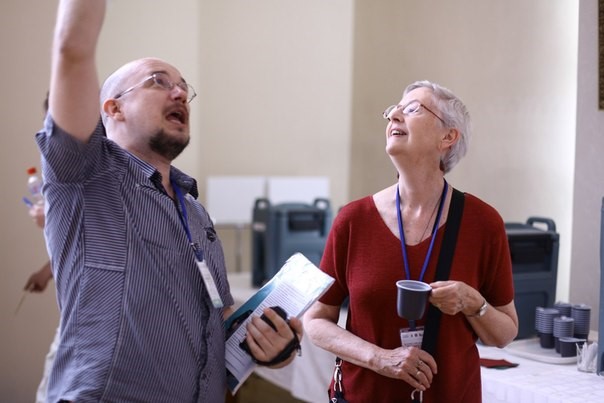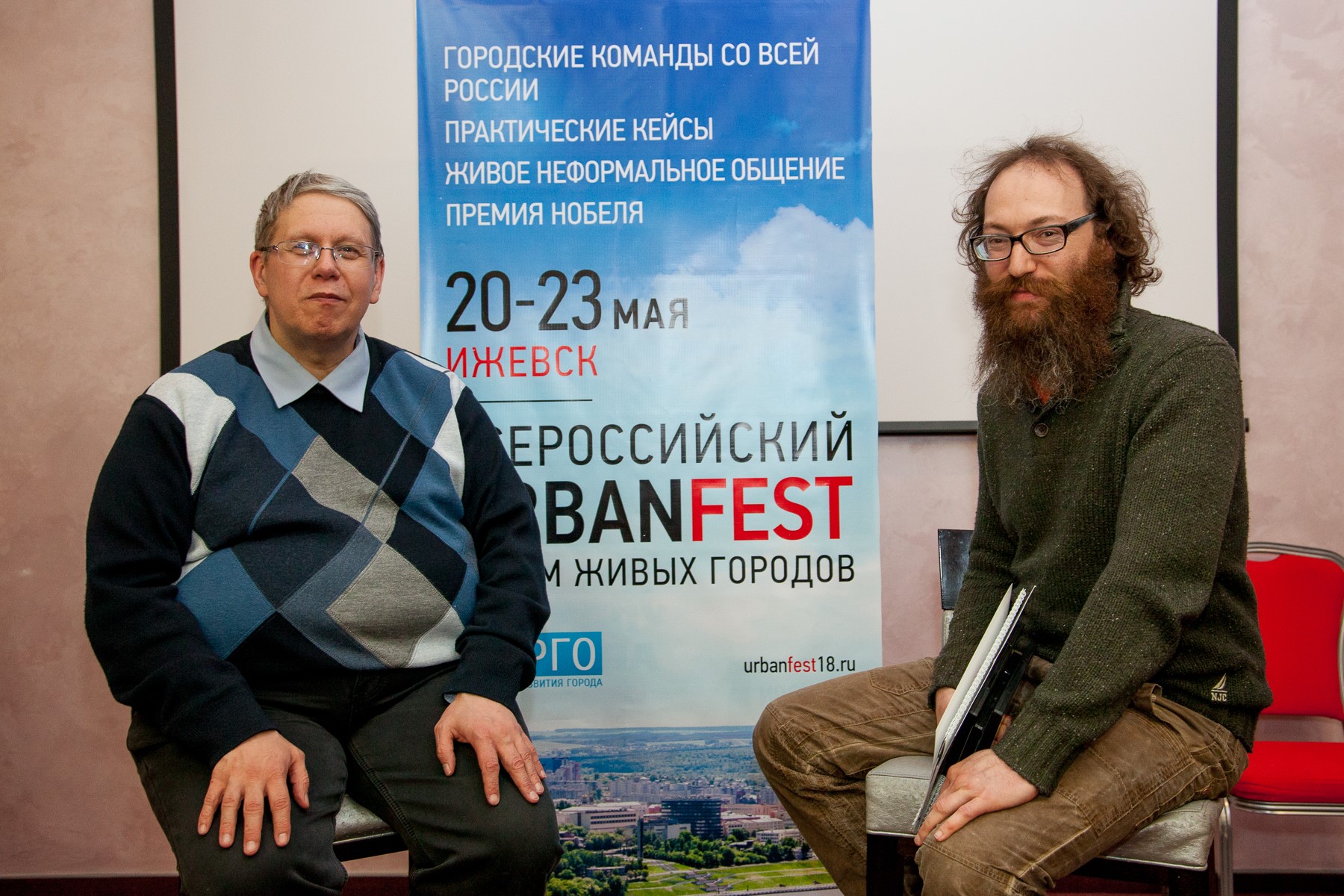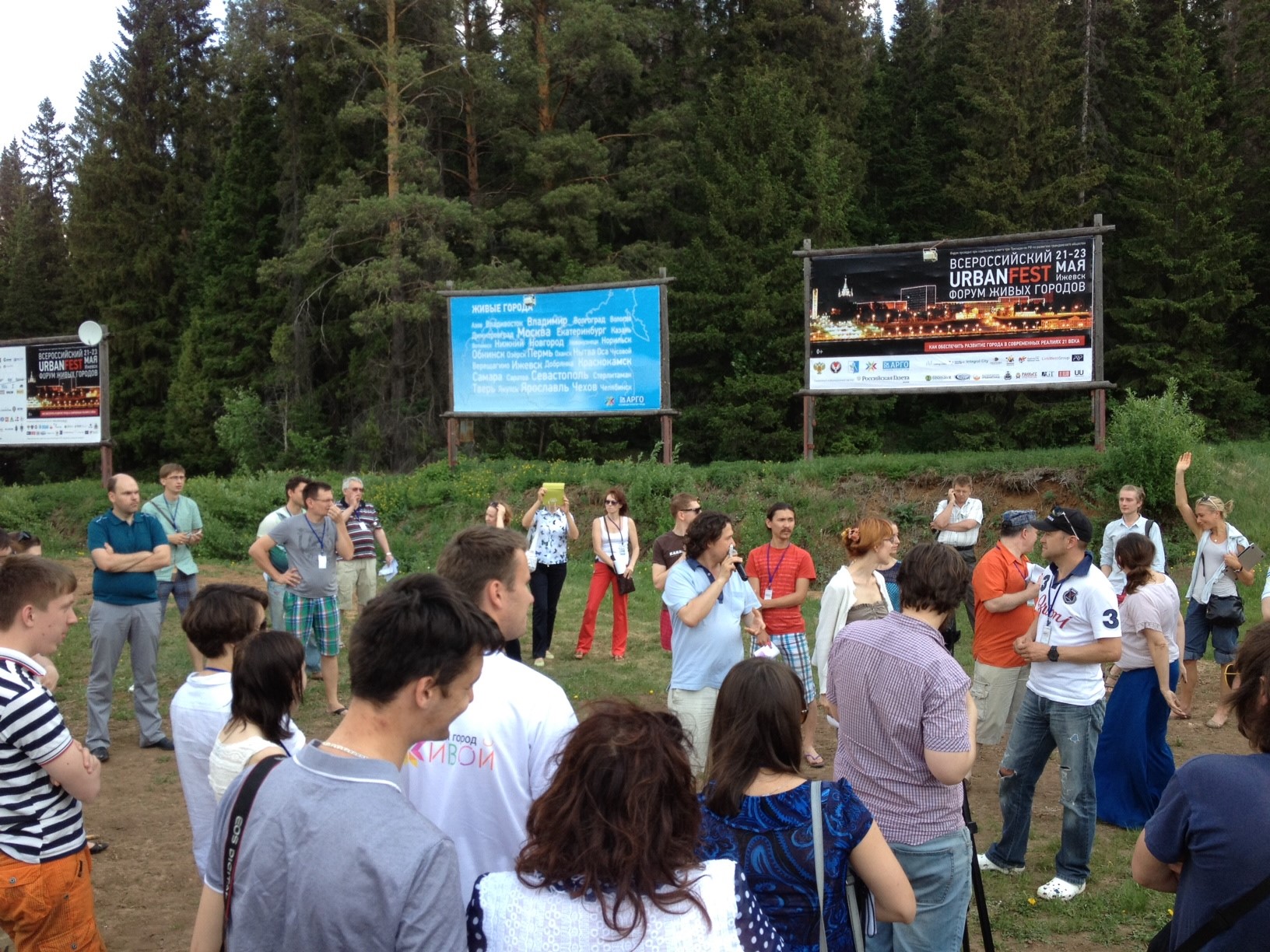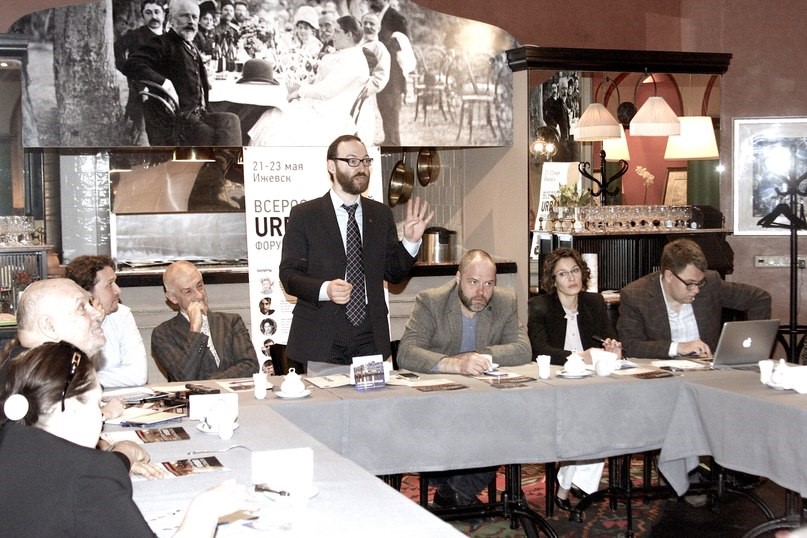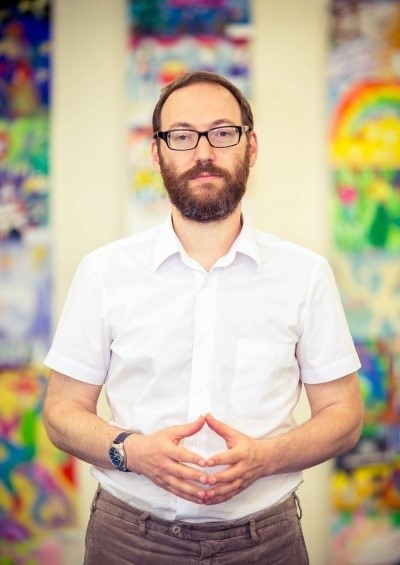
Marilyn Hamilton
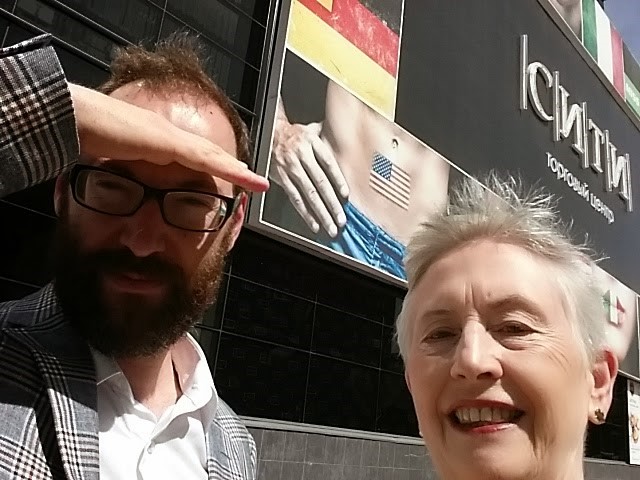
Lev Gordon and Marilyn Hamilton in Russia (2014)
Marilyn Hamilton: First off … thanks for taking the courage to open a portal in Russia for integrally informed Leadership, where not many people in the west can see the kind of leadership in Russia that is emerging through you and the team that you are gathering around you.
… How do you feel about what has transpired since you returned to Izhevsk from your work in Europe? What has changed since you brought a vision for new leadership to the International East European University and then expanded it to include the city of Izhevsk?
Lev Gordon: Dear Marilyn, it is my pleasure talking to you across the ocean while being on the same wavelength. It is a precious experience, a magic of Life.
As I answer your questions I also speak directly to the heart and mind of every person who is reading these words right now. This way we enjoy two things at once—the joy of sincerely sharing our thoughts and experiences, thus, learning from each other, as well as creating new links that connect people from around the globe, stimulating new insights, understandings and—perhaps—cooperation around issues common to many if not all of us. I would also add, quality communication creates hope—in the sense of opening new horizons and new perspectives for every person sincerely involved in it. Deepening understanding of what surrounds us as well as what silently vibrates inside each and every one of us. As we communicate and—as you say—meshwork—we can directly experience the level of being inside our psyche as well as on a transpersonal level and well beyond it that powers our lives, drives our successes, paints the big picture of life, vibrates in every cell and moves the galaxies across the cosmos.
So, yes, glad to be in communication with you right now.
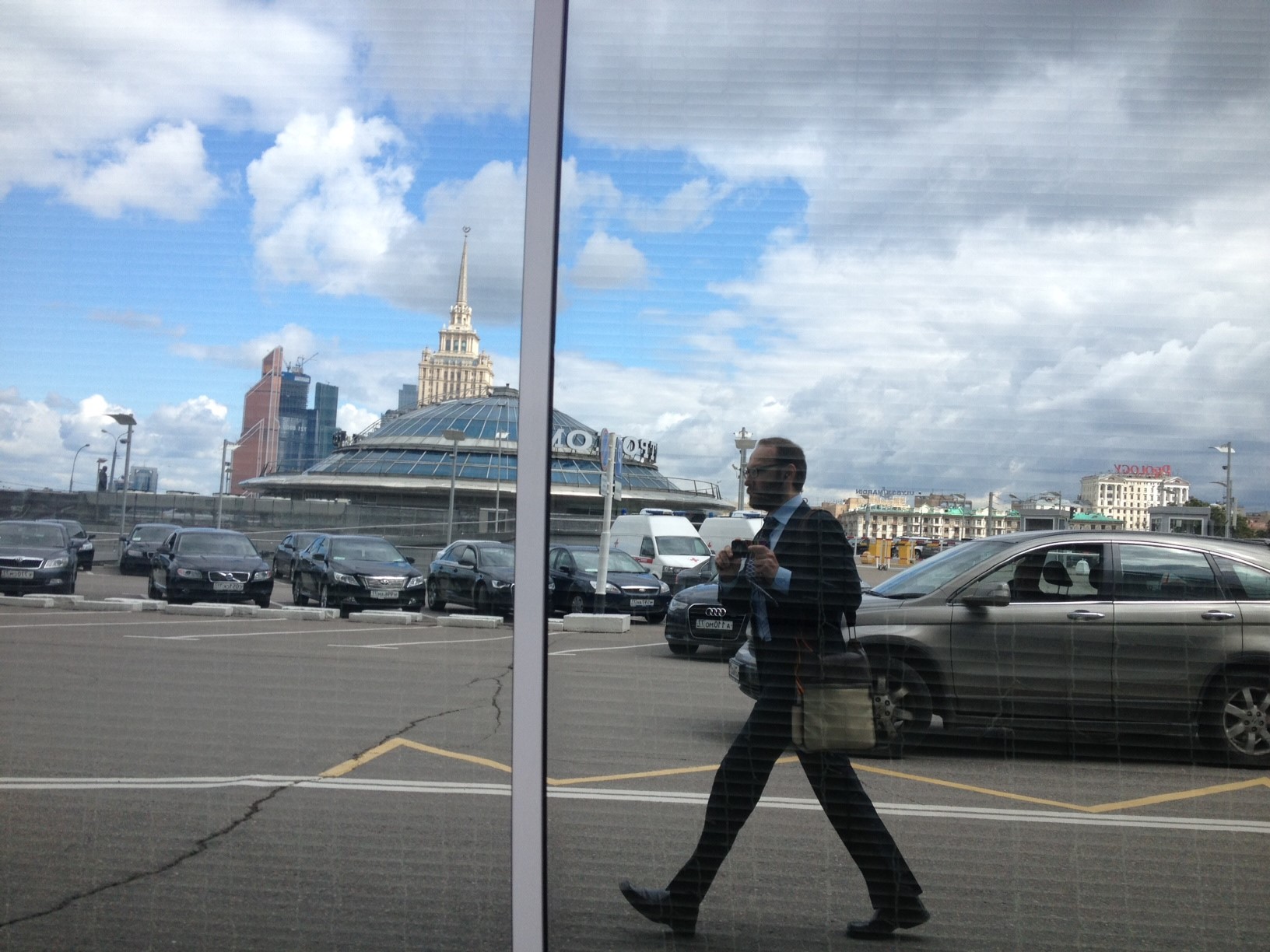
To answer your question about the last few years, I would first take time to briefly introduce what happened before—this way we build the base and context to better position the specifics of our dialogue—at least within a realm of one single person’s life as well as to have a better understanding of the ways Russian life is evolving and how it is intrinsically connected to the world.
I was born in 1973 in the city of Izhevsk, which is 1275 kilometers east from Moscow, right before the Ural Mountains. My family origins trace back centuries. On a wall in our home we have a Charter signed by His Majesty Tsar Alexey Mihailovich (the second Russian tsar in the Romanov dynasty, father of Peter the Great, known as “the unifier of Russia”) back in 1674 granting my great great… grandfather Maxim Ivanovich Pisarev nobility and ownership of the lands surrounding Moscow “for the exceptional service to the Tsar and the State of Russia”. Besides, many ethnic and cultural dimensions came together to create what we see today as Lev Gordon. Russia has always attracted and was home to many nationalities and people from around the world, and so we traced among my predecessors Russian, Jewish, French, German, Polish and Udmurt bloods to name just a few. And, on a cultural level, in addition to the treasury of my native Russian culture through education and life experiences I soaked in lots of what the world’s culture had to offer—from Ancient Rome and Greece to nowadays. This way as I speak and act, the world itself looks through my eyes and speaks with my tongue. Life experiences itself through myself and our conscious interactions each and every moment. An interesting feeling, the one each of you can relate to I am sure.
Anyway, I grew up in a family environment filled with love for each other and for the world, studied 7 years in a regular school and then entered for last 3 years a specialized school for “talented” children. I always enjoyed learning and there I found a rich and stimulating environment, where teachers sincerely helped us expand our horizons and most students were smarter and more driven than me. In 1990 I entered an international management program at an institute in Saint-Petersburg, and lived for 5 years in that majestic city with magnificent architecture and rich cultural life, a university by itself. In parallel, I studied 3 languages, entered a law school as a part-time student and also studied for 3 years various cultural topics at The French Institute in Saint-Petersburg, thus crafting a rich and diverse learning environment to satisfy my inner interest for growth and development.
As in 1993 I waited for an airplane in Charles-de-Gaulle airport in Paris (returning from my first internship abroad) I picked up a small thick green book from a shelf and looked at the title: Moby-Dick by Herman Melville. It is then, scrolling through the pages I suddenly discovered what for years became my motto, a phrase that resonated deeply and perfectly described the impulses that drove me for years.
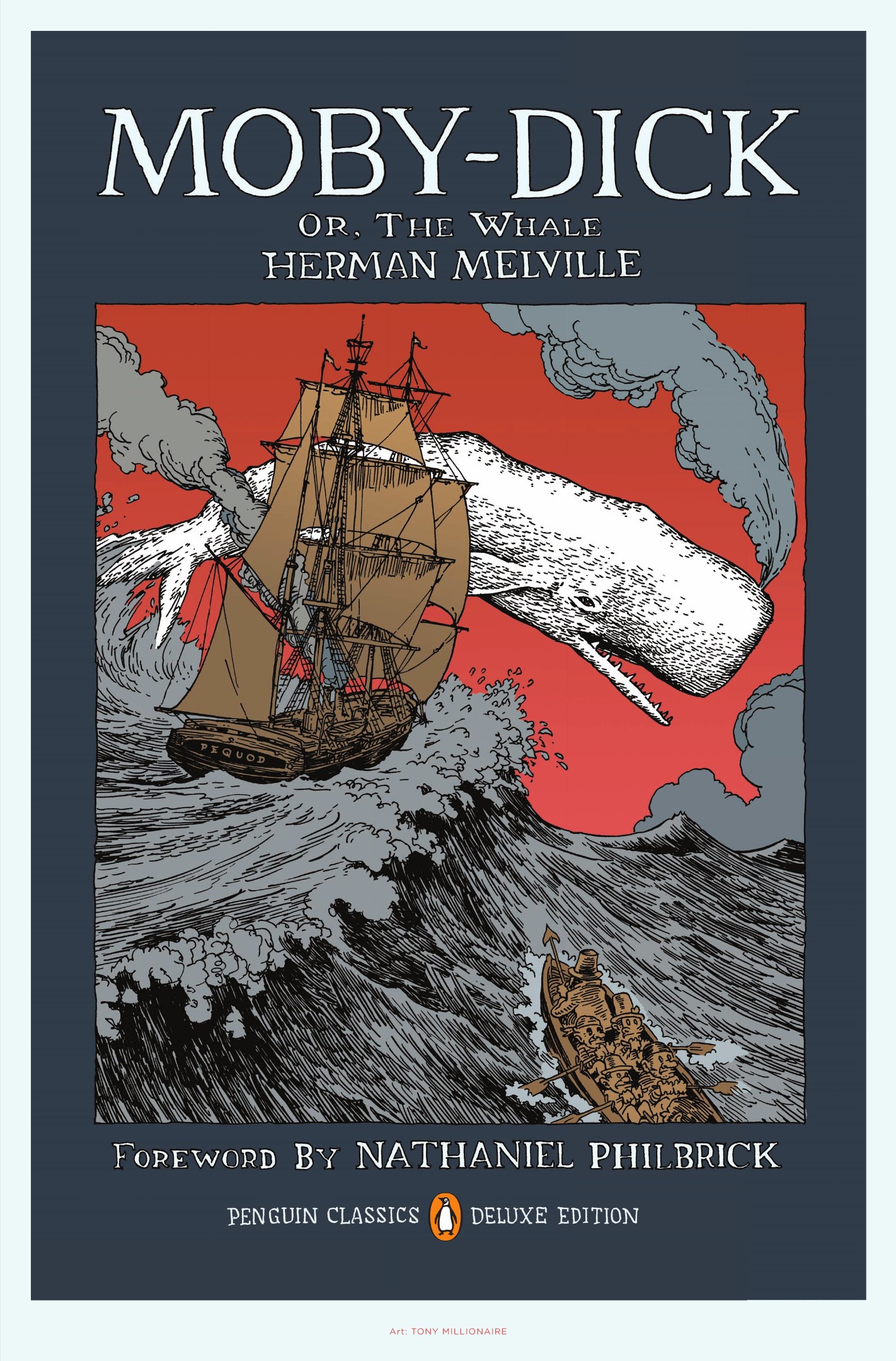
It goes like this: “With other men, perhaps, such things would not have been inducements; but as for me I am tormented with an everlasting itch for things remote. I love to sail forbidden seas and land on barbarous coasts”. In a flash it became evident to me that such was my inner drive to explore new things outside as well as inside, understand all facets of life and expand horizons in every directions. Thus, following this energy I later studied in many universities and business schools across the globe (including Russia, France, USA, Poland, UK and the Netherlands), lived in 11 countries and worked on projects in 35 countries with multinational companies ASCOM and ING Group. Still it was always clear to me that I was gathering skills and broadening my understandings to ripen as a person and as a professional to later come back to Russia and contribute to my country’s evolution and well-being.
In 1998, as I served as a director of strategy, marketing and communications at ING in New York, I took a sabbatical and was actually planning on moving to the Himalayas for a couple of years to practice meditation and such. Then my father died of a heart attack and the next day I flew over to Izhevsk—first as I thought, for a year to support my family and provide transitional leadership to the private university that he founded 15 years before—but then I realized that this was the actual “return home” as I became aware that I am more useful there than in any other part of the world. And so my service to the world through service to my native country started and it goes on now for more than 7 years.
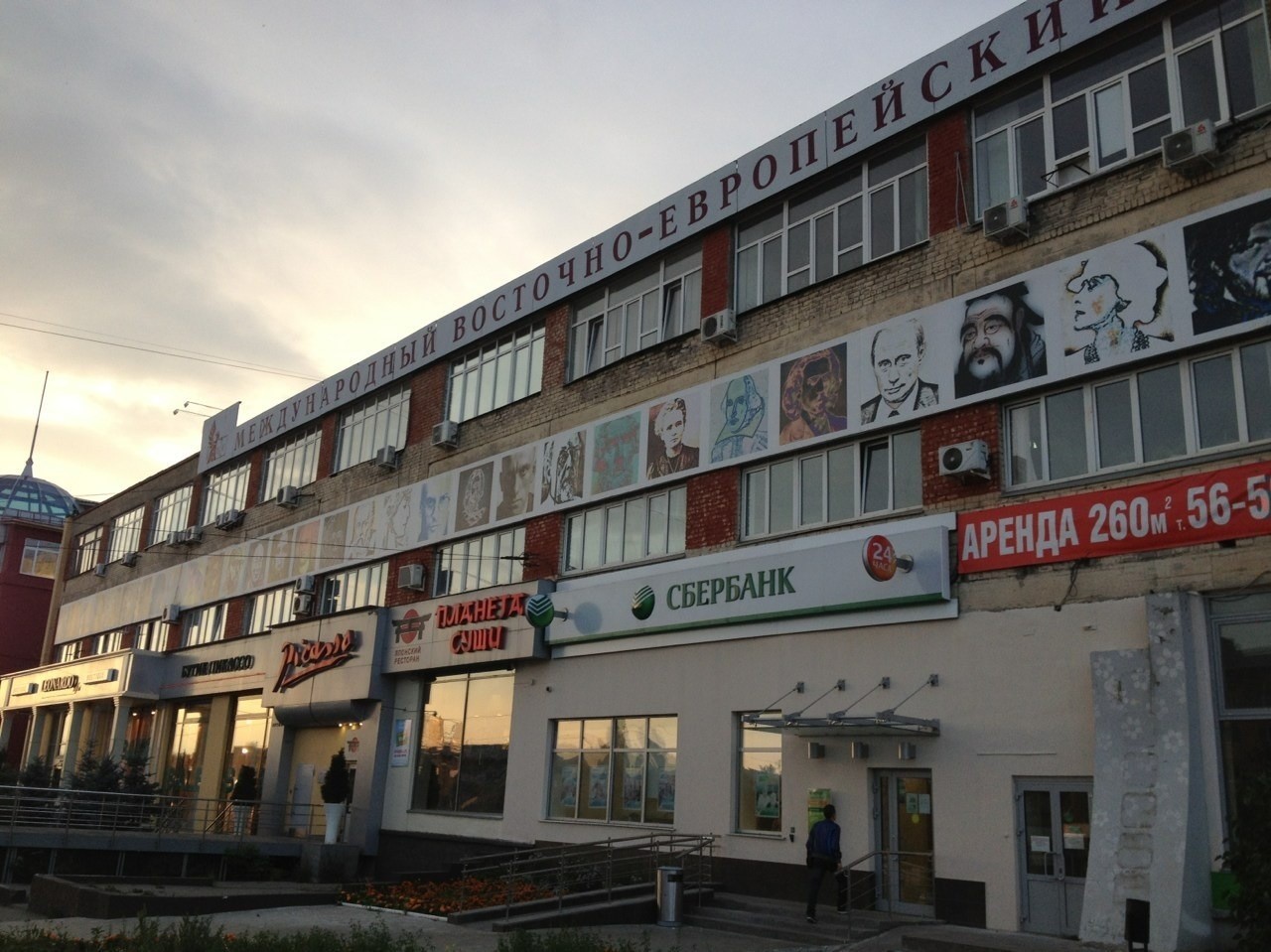
International East European University (Izhevsk) with the banners featuring great and notable Russian and foreign personalities, including Ken Wilber in the middle
I served as a president of International East European University for 4 years, catching the leadership helm from my father right before the crisis of 2008. We had a great team that worked together through the tough times, explored new ways of adult education, implemented cutting edge Training & Development approaches, created an online education platform learning from EdX and Coursera, established a regional business school, Institute of practical psychology and Institute of Life—a center for holistic personal development. In the business school I developed and ran several programs with John Kotter, #1 guru in leadership and change management from Harvard Business School. He was my favourite professor when I studied there and I saw his models as useful for advanced business community in Russia as well.
Institute of Life was established around the idea that to fully live we need to understand all aspects of ourselves and support their evolution—so various psychological courses, open lectures from outstanding artists, scientists, entrepreneurs, politicians, philosophers and other special guests from across Russia and from all over the world. We offered a variety of trainings, different styles of yoga from hatha to kundalini and everything in between, chi kung, martial arts, calligraphy, dances and so on were run there. I think that was the first full-scale personal development center of such kind in the region. We even offered meditation and yoga as a regular part of daily routine for all university staff and some students. Initially it was met with caution, yet soon was much appreciated as it provided deep relaxation amidst daily stress and regular opportunity for deepening one’s self-awareness.
In everything I did I was following the goal that we always considered as key with my father: to promote culture of conscious living in the society (meaning how people think, act and interact). Today, I would call it “integral human development on personal and social scale”.
In 2012 I felt it was time to work with a broader ecosystem and I passed the university to my partners; shortly with a few other young successful businessmen and the city mayor we established Association for City Development (ARGO in Russian). So for the first time in my life I started to think and act on a city scale. Before I sincerely considered city as something that the Mayor and the City Council somehow magically run and where there was no place or need for my participation. Somehow that concept turned upside down when we started to look inside that black box. We soon discovered that most city managers were overworked, under-resourced, lacked experience and skills necessary to operate such a complex system beyond routine functions. Above all, no one had a vision as to what city really was and where it must evolve. Quite an insight I tell you. My colleagues were equally surprised and we all decided that we would invest our spare time and resources in improving things and take responsibility for supporting city administration in making Izhevsk more attractive, smart, comfortable and conscious. That was the beginning of a journey that is ongoing in Izhevsk and now expanded to other cities across Russia.
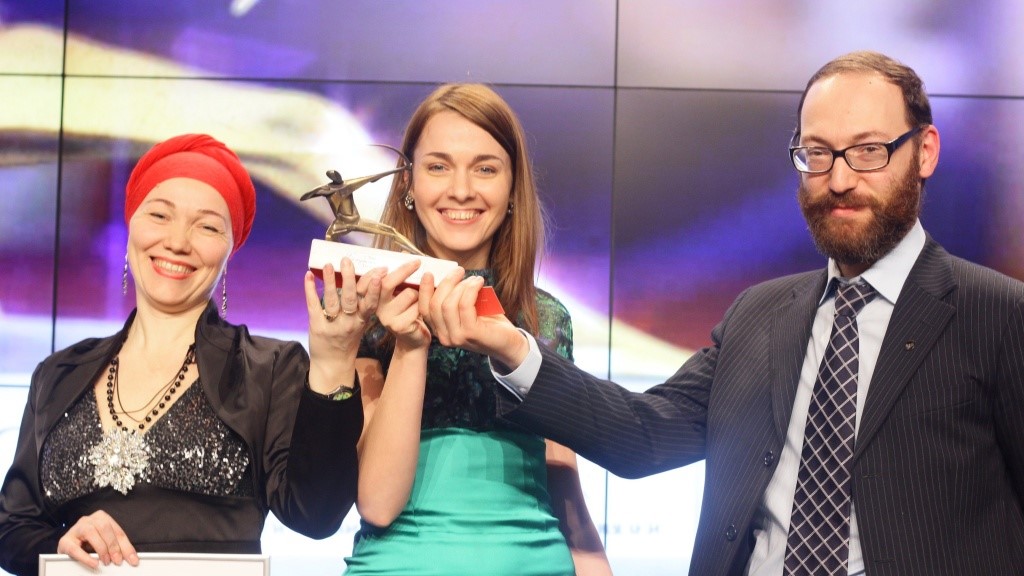
Lev Gordon and his ARGO team receive Serebryanny Luchnik (Silver Arrowman) National Award for “Best Project in Territory Development” in 2014
MH: How did you become attracted to Leadership and teaching Leaders?
- Who were your early leadership models? Father? Mother? Others? In what ways have you borrowed leadership qualities from your early models? (e.g. father, mother)
- What took you abroad to study at Harvard (elsewhere)?
- When/How did you start teaching Leadership at ING? What opened the door into the world of banking?
LG: Undoubtedly my father and my grandfathers were key early influences as each of them was—as I now understand—an accomplished leader for his time and place. You know that leadership among other things is about having a vision and creating trust so people choose to follow you. Well, Eduard Gordon, my father was definitely such a man, a “serial entrepreneur”, founder of new organizations, social structures and meanings who was loved and respected by many colleagues and who could manage increasingly complex systems, understand and influence other leaders and people from all walks of life.
From my early years he would always immerse myself in communication with his friends and fellows from various cities and countries, professors, scientists, politicians, businessmen, leaders, artists and inventors. It clearly gave me an early vision of human diversity and the power of the human spirit, our innate ability to create and co-create. While during perestroika and Russia’s move to free-market economy he was financially successful. He was mostly engaged in what now is called social entrepreneurship—establishing new department at Udmurt State University, then a first private college in the region and then a multi-campus private university. So while I am in no way able to match his powerful energy I definitely soaked in both some of his personal qualities and his inclination for world improvement.
What I added to the solid foundation that I received from my forefathers is perhaps a stronger emphasis on the dimensions of soul and spirit. I consciously use it in my work with society and various projects. Perhaps we will touch upon it later in our interview.
My grandfathers Semen Evseevich Gordon and Georgy Lvovich Pisarev both came to Izhevsk before the Second World War and worked for 40 years at the two main factories—in the last decades as deputy general manager responsible for (the largest in the country at that point) factory transportation system and chief designer (again of the largest in Europe motorcycle factory) respectively. Each was well known in the city both for their professional mastery and personal qualities—kindness, humbleness and integrity. As I later learned many leadership concepts from books I discovered that throughout my childhood and youth I was surrounded by what Jim Collins called “level 5 leaders”.
While I did not meet them in person, my great grandfathers were also interesting characters who still inspire me. One of them—Lev Nikolaevich Pisarev was an architect who designed and oversaw construction of a majority of beautiful buildings in the northern city of Archangelsk. When I visited Archangelsk in 2010 for the first time, it was truly amazing walking along the streets of this place realizing that this, and that, and this and that and so on beautiful buildings (several dozens overall) were created due to the vision, inspiration and efforts of my great grandfather. An amazing example of legacy that stays after we move on, right?
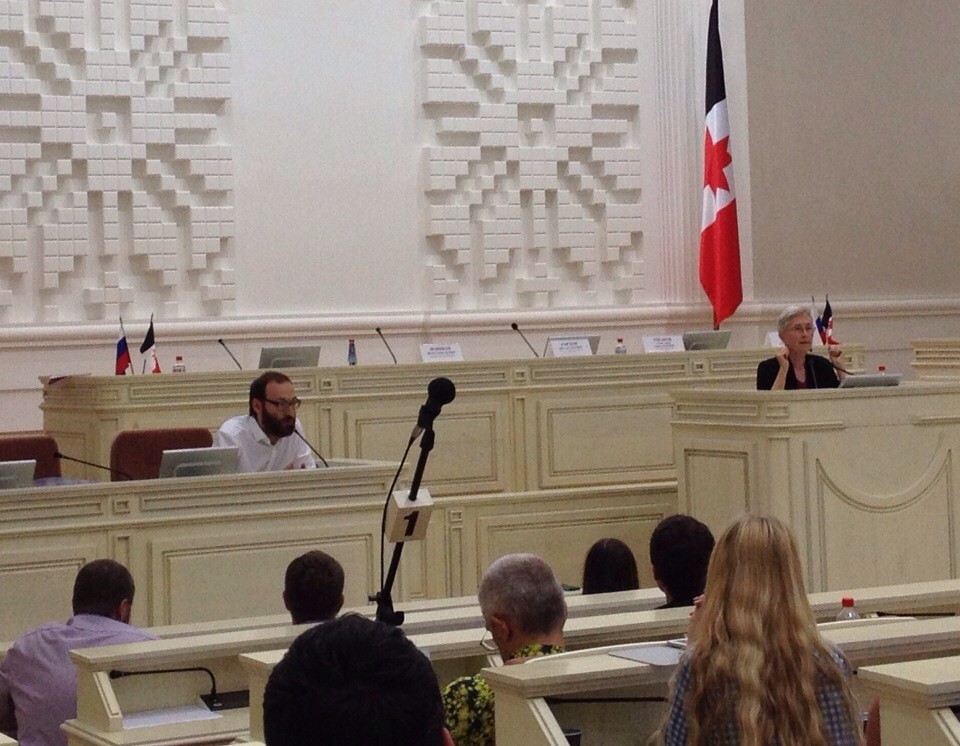
Lev Gordon and Marilyn Hamilton speaking at the Udmurt Republic Parliament at the opening of UrbanFest 2014
What was funny in a way was that throughout my youth I was initially rejecting the notion of leadership and leaders—likely due to some unclarified psychological tensions with the “strong father”. As I later brought more awareness and inner practice through Western and Eastern approaches this tension disappeared and instead a fascination with leadership came into my life.
After initial learning from various role models in private and social environments, my conscious immersion in leadership started in 1998 as I was selected for Global Management Program (later rebranded Global Leadership Program) at a global financial company ING Group. There I received an amazing opportunity to live in many cultures and study from various leaders, while attending special leadership programs at the very top universities across the globe and then immediately applying new skills in my job. As I look back I cannot escape feeling profound gratitude to many of my mentors – Philip de Koning Gans, Hans van der Noordaa, Chip Norton, Jim McInnis, Keith Gubbay, Bebe Wilkinson, Fred Hubbell and others – who provided me with opportunities, trust, support and personal examples that facilitated my growth through the 10 years that I worked there.
In addition to growth through professional engagements, I was constantly exploring the laws of leadership and lives of leaders through research and studies that I ran in forms of interviews with various executives at ING, through EMBA and executive education programs at Columbia Business School, studies at Yale University, London Business School and later at Harvard Business School. There I also met amazing individuals who provided me with tools and inspiration to go deeper into what makes a leader and what leaders do to leave a lasting legacy.
As over the years I built an integrated framework of leadership and saw how it all works in practice, I also started to gradually mentor others and teach these skills to professionals and students across the world. Finally, seeing authentic leadership as key to social development in the last few years I actively teach leadership throughout Russia using various channels—from writing articles in business and general interest magazines to taking speaking engagements with high school students, civic and business leaders to running ExEd programs, to doing expert work with government institutions to mentoring and coaching leaders of all kinds. Everywhere my key message is simple: develop and follow your intuition, find your true mission, be true to yourself, respect and support others, build integrity and trust, communicate from the mind as well as from the heart, use this short life to realize your potential and leave a lasting legacy. We also always discuss Integral Theory from Ken Wilber and its practical implications for persons, organizations and society overall, as well as other integral models related to leadership, development and communication—from Wu-Xing (Chinese five transformations) to Life Matrix by Song Park. For many people that starts their personal journey of self-discovery and joyful growth.
MH: How/when/where were you introduced to Integral (Theory/Practice)?
- What was attractive to you about it?
LG: In 2005 I met Alexander Nariniani, one of the best translators of Buddhist literature in Russia who later became a publisher of all things Buddhist as well as books from Ken Wilber and other integrally informed authors. In 2008 Sasha brought me in contact with Eugene Pustoshkin and they together initiated me so to say (laughs) into AQAL, Spiral Dynamics and so on. Immediately, I saw the systemic nature of these approaches and greatly rejoiced at how deep, all-encompassing and at the same time how clear, practical and useful they were.
I started applying them to my personal development, family daily life, then business, then on a city-scale and then to nationwide projects. At every level it worked perfectly.
MH: What is the connection for you between Integral Theory/Practice and Leadership? How does one inform the other?
- Was there an awakening to an integrally informed leadership in you personally? Did it become an interest, a curiosity, a calling? What was that experience like? How has that kept you going (despite challenges – internal and external)?
LG: Leadership is all about people, how they connect, what drives them, how they see the world. Hence, an integral approach is directly related to all aspects of what leadership is and what leaders do. Ken Wilber and many in the integral community repeat “this is not a territory, this is a map”. Well, then if leadership is like the Paris-Dakar rally, then an integral approach could be easily likened to the map covering the whole distance – including hills and valleys, describing various types of soil, indicating ditches and other obstacles and so on. And also the weather forecast J. Knowing various stages of personal and social development along with related values, motivators, de-motivators, etc. brings so much clarity into what you could do to invite people onto the journey. In addition, constantly taking into consideration 4 quadrants while solving tactical problems or building long-term creative solutions also helps keep an integral holistic approach with maximum effectiveness.
Besides, for me personally, insights from AQAL provided amazing clarity (in the not-so-clear, complex and often confused world of today) as to what constitutes a fair goal, what vision is worth pursuing. Thus, in my experience, AQAL and other tools from an integral approach serve both “to choose the game and to play it well”.
As for the feelings, having that kind of comprehensive knowledge provided me with an extra sense of certainty and hence was useful in many ambiguous situations, providing a sort of deep-seated trust in what matters and also trust in myself being on the right path when the results are yet to be seen and many people and circumstances are working against what you do and what you think is right. Using the same metaphor with the map for the rally, knowing which road to take serves you well at every turn and at every crossroad. You know what’s behind the corner and even what awaits you after a few days on the road and so you are well equipped to plan accordingly.
For me all this came very easily and naturally. After I understood – first from my friends and then from studying the related materials – the basics of the integral approach I had a strong sense of discovering something intimately known to me. A sort of “Aha!” moment, when all things suddenly fall in place and everything becomes clear. Like meeting an old friend after you’ve been away for a long time.
MH: What are the spiritual roots of your Integral Leadership Practice?
- How did that influence you in creating the “Human Festival”? What did that experience tell you about the state of leadership in Izhevsk/Udmurtia?
Since I was young I always saw the world as a big magic space filled with wonderful things and people, all interrelated with one another. This magic easily included all things rational and scientific as well. From the age of 13 I was reading various philosophy and spiritual books—yet they were only increasing my already familiar sense of awe about this big wonderful interrelated world we are living in. Reading Gospels and Carlos Castaneda I always sensed the same big “something” beyond these texts—indescribable matter unknown to the thinking mind yet always present so close to me, something that permeates all things material and is absolutely real, yet invisible and beyond words. From the age of 16 for some 12 years I was busy with growing in the world—studying , working, travelling—and the second wave of interest to spiritual knowledge started as I turned 28 years old.
I lived in New York then and there I met several Buddhist teachers—Lama Ole Nydahl first, then Namkhai Norbu Rinpoche with whom I studied ever since. My strong rational no-nonsense upbringing provided me with strong distrust for all things unfounded on logic and lacking clear evidence. Yet, key Buddhist views were remarkably simple, logical and easy-to-prove—all I needed to do was turn my attention inward and start researching my own mind, observe its workings and the whole rich world of thoughts, emotions and feelings. I later studied with Robert Thurman at Columbia University—when during my EMBA in Leadership and Strategy program I decided that taking his classes and understanding humans from inside was far more important to my future that taking another class on investments. That made me read many books and helped build some academic background in the subject, yet direct meditation experiences and practice of observing the mind came later and proved to be key to establishing a direct unshakable knowledge of how things are beyond what is visible to the eye.
Alongside Tibetan Buddhist practice, teachers and teachings as my core, I enjoyed learning various perspectives and practices—from Chinese Chi Kung, Zen and Sufi masters, exploring Confucius and Lao Tse, Ekhart Tolle and Byron Katie, ancient Shamanic teachings from Latin America and so on. Through my aikido practice (I still use aikido principles in all areas of my life) I met students of Sri Sri Ravi Shankar and then studied with this master of integrative Vedanta tradition both in the US and in India. I think he and all of my Buddhist teachers helped establish both an integrative view and practice. They were eventually most influential in supporting my inner growth that led to creation of a multi-perspectival complex world-view that I enjoy today. Clearly, my inner practices also provided me with clarity of mind, access to intuitive knowledge, tremendous stability and courage of being true to my inner values in any circumstances – which in turn became the foundation for my leadership under sometimes difficult circumstances and in often uncharted waters.
When I moved back to Izhevsk I naturally wanted to introduce citizens of my native city to the same wealth and richness of perspectives. With my friends and colleagues we came up with the idea of “Human Festival”—a showcase of various approaches to individual self-development, holistic overview of practices to develop/explore our body, mind and spirit. During 2 months we orchestrated and supported over 300 events throughout the city of 600 thousand inhabitants—from small group seminars on holistic health to lectures on the Integral approach—in cinemas and theaters, to large concerts of world music, ethnic dance events and exhibitions of various schools and masters that provide knowledge—from spiritual to psychological—for a person to explore and use. The organizing team were all filled with joy and gratitude for this opportunity to make this knowledge widely available in our native city, so during all 64 days we spent in an atmosphere of celebration of human spirit and total potential. Imagine – the whole city, mass media, administration, schools, musicians, bus drivers—everyone was connected to it one way or another.
We ran that festival together with city administration and it resonated well throughout the society—hundreds of high-school students attended lectures on Integral Theory from Anatoly Balyaev, hundreds of students and adults—including city leaders and the minister of culture—attended integrally-informed lectures from movie and theater star-director Ivan Vyrypaev. Throughout the festival we specifically wanted to emphasize the universal appeal of human evolution as well as importance of the left quadrants of AQAL—as the whole official lifestyle favored right(especially bottom-right activities and considerations) and we sensed that it is important to gradually shift the attention of the society to a more balanced and all-inclusive perspective.
While we did not repeat the Festival the next year, we continuously run these edutainment and other more serious formats to various publics. For example, this past year we had a seminar on an integral approach to stress management delivered by the founder of Moscow Integral Series Dmitry Baranov to 17 directors of penitentiary institutions, who got deeply engaged. Using AQAL tools we together looked at various ways of tackling some very serious situations that occur in prisons. Later the same day he has also gave a lecture on integral stress management to some 150 officers from the penitentiary system, and then to some 50 officers of the Russian federal investigation authority. Everywhere people appreciated the practical and profound nature of the knowledge and this represents our intention in all our activities – to offer people a richer view and advanced tools for dealing with real-life situations in their personal and professional life.
MH: Tell us the story of how you came to resource/finance the translation of Integral City?
- How/where/when did you meet Eugene Pustoshkin, translator (and now editor of this ILR – Russia?) What impact has Eugene had on your own leadership?
- What meaning / value did it have for you as a new President of the University?
LG: As I mentioned earlier, we met with Eugene in 2008 in Moscow—he was advising there a leadership team of a large holding company on how to implement an integral approach in their business. I quickly saw Eugene as a sincere and well-rounded person with deep knowledge of the Integral approach and so we started to exchange ideas online until I invited him to come to Izhevsk to give lectures to a group of city leaders on the Integral approach and how it could be used in city development. Nicely enough, this ground-breaking view was both simply presented by Eugene and well-received by the mayor and vice-mayors of Izhevsk, which led to subsequent collaboration around some city development initiatives, especially as to what relates to citizens’ participation in city development as well as in providing a framework for integral AQAL analysis of many problems and ways of solving them.
Now, that stage started also with your involvement, Marilyn! First, through your book Integral City, which translation into Russian Eugene initiated and we partly financed, and then with your visit and regular online communication with our team here. I will not exaggerate a bit saying that you quickly become deeply respected and loved by the members of our team.
In everything I did I had a steady feeling of assisting a birth-process of something that awaits its manifestation and recognition in our realm – like a notion that the Earth is round – something that ought to become a natural part of everyday life for thousands and millions of people. In a way, I felt being led by the intuitive knowing that this is what must be done.
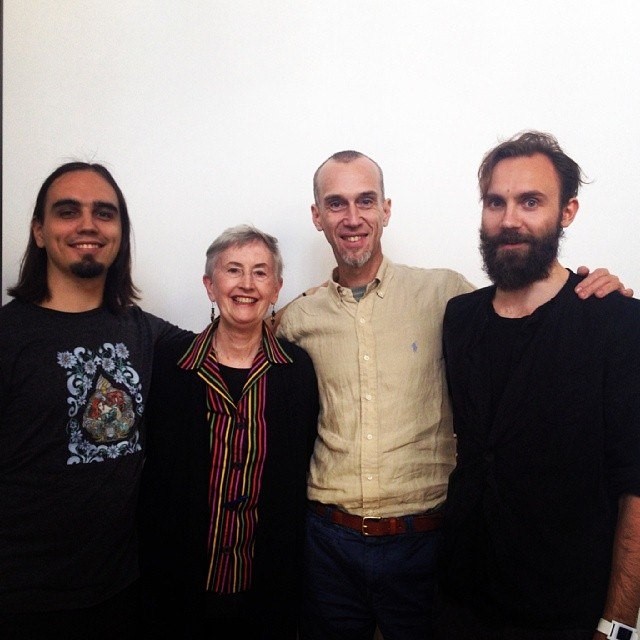
Left to Right: Eugene Pustoshkin, Marilyn Hamilton, Alexander Nariniani, Dmitry Baranov (at Marilyn’s presentation of Integral City in Moscow, May 2014)
MH: Tell us the story of how you came to create ARGO? Describe your intention, Vision for ARGO?
LG: In late 2012 as I again was hoping to get away from active social life and move to my “mountain cave” (laughing)—now with my wife, who in her own ways was definitely a more dedicated and disciplined yogi than me—a new city administration asked me to assist them with developing city strategy based on a “scientific approach”. “We do lots of things, but somehow they are all spontaneous, unconnected, unplanned, and whatever we do we inevitably get bashed by someone. Can we develop a comprehensive strategy on how to improve life in the city? We are here for a few years and we want to leave a legacy we could be proud of”. The guys who were all in their late 30’s to early 40’s, came from mid-size businesses, had support from the governor and a sincere desire to innovate and move things forward on a city scale. Still, I initially hesitated, as I was not sure they really were committed to follow through. Besides, I never had any experience of working closely with authorities and had vague doubts as to what it means and whether I will have to face any moral dilemmas for reasons yet unknown to me. Yet, as they seemed (and later turned out to be) sincere and engaged and as the appeal of putting my skills to use for the city was significant, I consulted with people in the know and received confirmation that the city managers were “clean” and really focused on improving things more than any of their predecessors in recent history. So, after careful research, several discussions with people whose wisdom I trusted and listening to my intuition I said “yes”. By the way, perhaps the most lucid advice I received from Eugene Pustoshkin, who said “people in red and blue administrative structures will most likely be constrained in how far they could go along the developmental path, so do not expect quick changes there… but if you feel that bringing your conscious awareness and practical skills in this environment is something you could shoulder then your very presence there will influence other people’s minds and the overall situation to some extent… see if this resonates with your inner core”. I looked inside and it resonated, so I released all expectations of quick wins and went into it just to be consciously present to whatever happens.
Considering the actual task at hand, I was well familiar with strategy development in the corporate world and eager to apply best available knowledge to city development. To better research the field I hired a project manager Nikita Ananichev (he came to Izhevsk from Zurich, where he worked and studied psychology) and together we explored best practices in this area throughout Russia and some other countries, as well as finding many key consultants in this area. Then we started to invite them one by one to make presentations and discuss their methods of developing a working strategy.
Around the same time a few old friends and some new acquaintances—all young successful entrepreneurs—learned that people at the helm of a city want to do something progressive and are open to cooperation with smart active citizens. So all together we established the Association for City Development (ARGO in Russian), which soon combined several dozen leaders from business, administration and society joining forces to integrally develop the city. We were energized by the natural joy from our shared purpose and common activity with other people we trusted and respected as well as by the sense of freely choosing the future of our city.
In our discussions and express analysis we clearly saw several important trends: a) in the 21st century all cities actively compete for resources, especially talents and investments; b) few cities know how to compete, as they are used to a planned economy and parental control from the government in the 20th century; c) cities that are reluctant to change or unable to offer a modern stimulating attractive environment to its various constituencies will gradually lose their life force and slowly degenerate, as the best people, money, ideas, technologies and attention will migrate elsewhere; and d) city administrations alone will not do the job, as their resources are severely stretched while their attention, motivation, competences, values, control systems, etc. are all focused on maintaining the orderly functioning of the city in the short term and few are willing or able to go beyond and focus on development through investing energy in projects that will yield results in the longer term.
So, the idea was simple—if we bring together best people who sincerely desire to improve life in the city and actively engage in open dialogue and subsequent cooperation together—we can create vision, strategy and then gradually influence key decision makers on various levels in moving along this path.
Some 10 presentations from external speakers about various approaches to city strategy formulation and city development were run every two weeks and attended each time by some 70-90 leaders from business, administration and society. We then ran city diagnostics in 12 key areas and by June had a holistic picture of what’s going on and what needs to be done in the city.
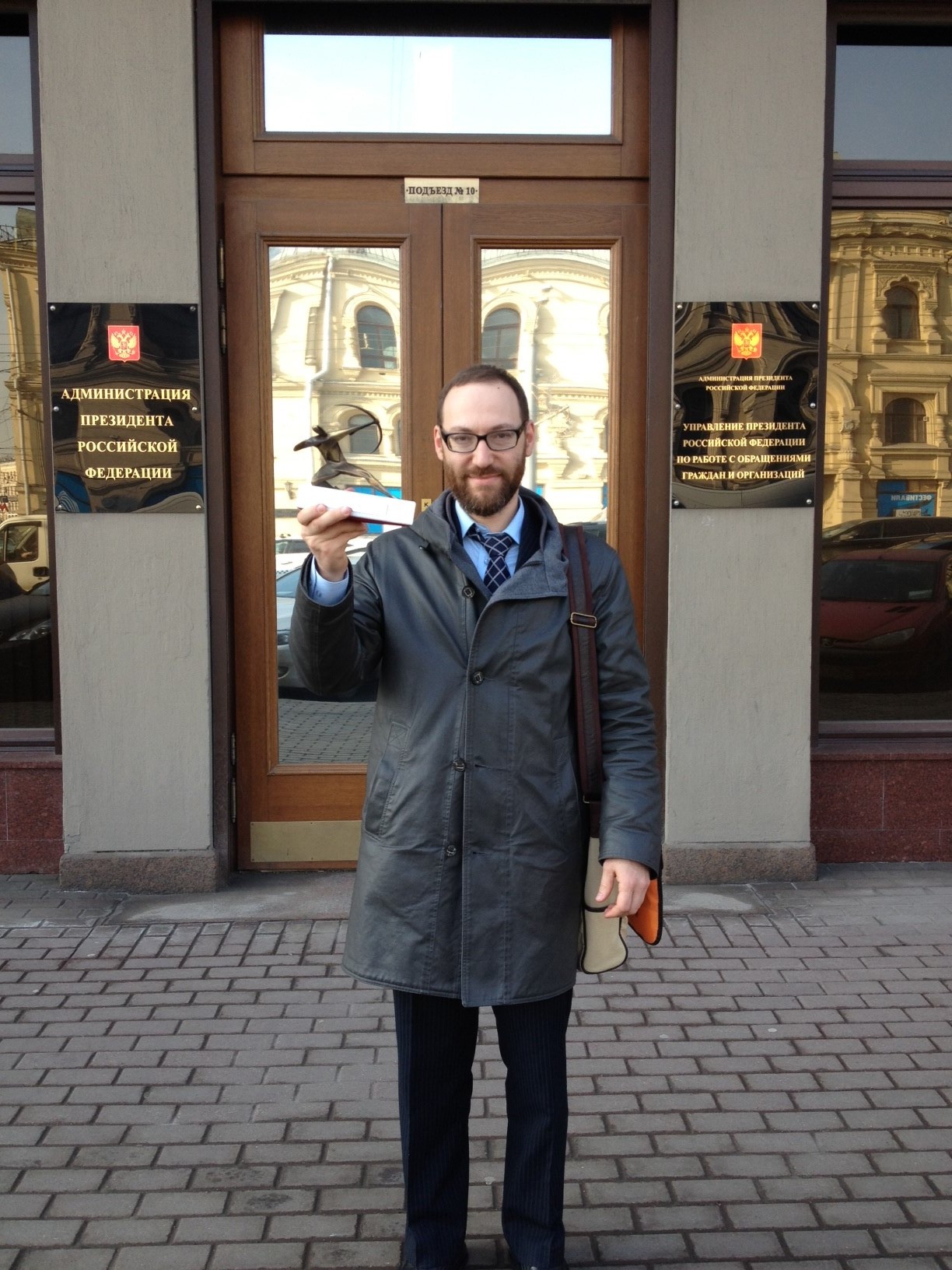
Lev Gordon after a meeting with Chairman of the President’s Council on Civil Society Development and receiving a national award for “Best Project in Territory Development” in 2014
The key finding was that—now hold your breath—it is virtually useless to create a city strategy, since there is no qualified subject to run it going forward. Let me explain: strategy postulates what big steps you wish to take to achieve your vision specified through some goals. The key is to have someone who is willing and able to go through these steps and make this vision a reality. Well, after analyzing the structure of power in the city we discovered that there is nobody who has enough vision, willpower and resources to implement even the most advanced strategy of city development. Overall nine different groups influence life in the city from these sectors:
– city administration
– regional government
– federal government
– big local businesses
– big federal businesses
– small and medium local businesses
– citizens
– NGO’s
– mass-media
All these groups have their own interests that are often conflicting. Communication and trust between these centers of influence is almost non-existent. Nobody has long-term will power and resources to drive or supervise city strategy implementation. Changes in city administration every 4-5 years make even this—seemingly most likely candidates to drive city strategy development and implementation—also a very weak one. Civic society is non-existent and mostly incompetent to manage complex tasks. Add to this a total lack of leadership culture and skills to bring these centers together around the city development agenda. Alas!
We felt like a painter who was readying himself to paint a beautiful picture and with the first brushstroke he discovers that the canvas is decayed and is falling to pieces. The key elements that normally hold the society together—communication and trust among its constituencies and key institutions—were severely lacking. Not what we expected to see, as from the outside we never seriously thought about it.
As we looked closer, we realized that 25 years of undergoing a major shift from one social structure to another have brought chaos and destroyed most old connections and ideals, while new ones were not really in place yet. The sense of unity and stability in the country was greatly destroyed in the 1990s, and most people moved from an ethnocentric level to egocentric level—surviving, protecting, building and protecting again their personal sphere, family, business, but rarely having enough vision and energy to care about what’s beyond that. Such a fragmented society clearly was not in a position to think about the future of a city and not capable of making this future happen.
Did we give up, became disheartened and lost our desire and ability to act? Not so quickly. Instead, we analyzed again our motives—are we here for quick gains and fame or are we here to truly improve the lives of people in real circumstances? The latter was true for most of us—so we accepted what is with love and understanding and consciously took a meta-position, keeping our vision (“Transform Izhevsk into a modern flourishing city”) but changing our planning horizon from 2-3 years to 100 years and formulated 3 main goals:
– Find, unite and develop leaders to create qualified subject of city development
– Initiate and manage specific city-scale projects to improve life and develop city now
– Take care of ourselves to sustain willingness and attract resources for the long-term task
We consciously agreed that we would stay away from political struggles, unite all good people and leaders with a development agenda and together focus 100% on supporting positive developments on a city level, building trust and cooperation between different stakeholders, repairing the social fabric and supporting innovations, thereby stimulating growth of conscious living amongst citizens and communities. I think that as we acted from the heart as well as mind most people who came in contact with us felt our deep-seated intention to integrally develop the place where we lived and improve the lives of people there and so not all—but most—people tended to support our initiatives and rejoice in our successes.
Ultimately, bringing together the best people is the foundation of eventually activating a collective mind of a city—something that clearly will take years, maybe generations, but the objective is clear. I think the ability to join minds in envisioning the common future and hands in realizing the common vision is a characteristic of most advanced nations as well as cities and smaller communities. Unity is power.
On a practical level, our work consists of daily meetings, project implementation, negotiations within the city and with external stakeholders and so on. Staff includes now 4 members (director, 2 project managers and a PR specialist who also runs a few projects). Legal, book-keeping, design functions are outsourced. There are some 1000 volunteers who come now and then for various projects and some 30 of them work on a regular basis helping with projects where they could invest 3-5-10 hours per week. Most of them are students in their late teens. We see a growing trend of corporate volunteering as well. To finance all operations we have contributions from businessmen who created a Supervisory Council and invest monthly an amount equal to an average monthly salary. This covers some 30% of expenses. 60% come from corporate and individual contributions and some 10% we receive as project-specific grants. We feel it’s important to grow the base of supporters, as this shows that while we implement a very advanced and tall vision we are still connected to the reality. Grounded in real life and can relate to real people. One of our experts, a key Russian futurologist Sergei Pereslegin aptly said that “city is what connects mundane and divine, Heaven and Earth”. So we are also trying to connect in daily life our highest view with very pragmatic steps and practical technologies. This does not always happen but we keep on trying J.
MH: When we first met you said that Integral City offered you 2 powerful ideas/precepts that you could use right away—one was “follow the energy”; the second was “convene the 4 voices of the city”?
- In what ways were these useful to you as a leader? How do you see them influencing other leaders?
- What has practising these precepts contributed to your leadership?
LG: In our work we started believing that everyone will join it and support such a clearly beneficial goal as city development. We were somewhat naïve. Some people started to oppose our activity—mostly from the old paradigm “divide and control” or from a general lack of critical thinking and lack of understanding that “united we win and divided we fall” or from some personal traumas that made them project upon us various phobias and fears. Most amazing was to hear that we “grab money from the city” while in reality we never took anything while contributing significantly from our personal resources—both financial and through significant investments of personal time and advanced skills. Anyway, we “got over it”, and still found that sometimes going in the seemingly right direction and pursuing important goals we were like banging our heads against the wall. Either people or structures just did not let us go where we needed to. That—especially as we all were doing it intensely and in our free time outside of our main jobs—depleted our resources and lowered our motivation. Then we had a conversation with you where you mentioned that simple rule—“follow the energy”! Go where the energy flows. How simple and how powerful that was for us—we immediately stopped projects with low energy and strong obstacles, and instead reoriented ourselves and our teams on doing things that both bring practical results and are filled with joy and meaning. We stopped fighting useless fights and started building in the open spaces. That was a fantastic feeling!!! Thank you! Every now and then we quote you and send you our love and appreciation, Marilyn.
As to the 4 voices—that paradigm rang true to us from the very beginning. We focused on identifying and uniting leaders from business, administration, NGO’s and active citizens around the idea of building our common future and many active, smart, progressive people responded quickly. Overall, in 2 years we ran some 300 group meetings and over 60 city-scale projects where a total of 60,000 people participated. Also, an important indicator, our activities attracted attention from the media with over 700 references in federal, regional and city media. Leaders from some 60 cities across the country attended our events, including 2 large national forums in 2014 and 2015. ARGO received a dozen or so prestigious awards both on the national and international arenas, by both independent and government bodies, represented Russia at World Communication Forum in Davos and was selected as a best practice for city development by Agency for strategic initiatives (head of ASI supervisory committee—Russian President V. Putin) and by the Civic Chamber of Russian Federation.
So you see that the basic principles we put to use worked very well judging from the outside at least. There was another major gift we received from you – that was “first take care of oneself, then care for those close to you and then move on to improve the city/world” [Editor’s note: Integral City Master Code]. We all rejoiced in applying this principle after months of doing it vice-versa, where we tried to change things at the distance while clearly neglecting some basic needs of ourselves as individuals, our families and teams. The moment we changed our perspective our level of energy and level of satisfaction started to grow and it provided us with increased dedication to what we do along with greater flexibility and self-forgiveness for not solving all problems and not doing all projects at once. Now that I say this, it sounds obvious, but the issue of personal borders and respecting one’s own limitations is one that many readers may resonate with as well I think. So this was a good lesson.
MH: How did the idea of UrbanFest arise? Who was attracted to your dream?
- How did the team work? What style of leadership did you/your team use?
- What leadership practices contributed to attracting 35 Cities to Urbanfest 2014?
LG: As we saw that things work in practice, we felt an impulse to both share our approaches with other cities and learn from them. Talking to two great professionals in the field of urban development—Sergei Gradirovsky and Denis Vizgalov made us certain that such teams exist and it is time to bring them together. So in 2014 we overcame our reservations about our ability to tackle such a task and decided to organize a national forum for city development enthusiasts—inviting leaders from business, administrations and society who move cities to come together and exchange best practices. We called it Forum of Living Cities (UrbanFest) based on the idea that cities are like living organisms and leaders who think about their future and build it are like the consciousness and the spirit that powers and directs our bodies. Cities that are aware, process the signals and act to adapt and develop, are alive and healthy, while those lacking these key capabilities are sleeping, sick, handicapped or call it what you will.
Anyway, we all were inspired by going to the next level—and it worked very well, as some 200 smart and driven people came from 35 cities across the country including city mayors, vice-mayors, businessmen and activists alike. We used open communication, inspired leadership and holistic worldview in everything we did. In the morning some went jogging along the river Kama, while others went to do yoga or chi kung in the beautiful fields of yellow dandelions. Practical workshops, case studies, informal communication with experts, night songs by the bonfire, early morning strategy sessions and many other engaging formats filled all 3 days of the event. Many were also attracted to the direct language, sincere and simple messages that permeated our communication. Overall, we felt that things that support life and evolution are all we need to make anything good possible—and that inspiration and life-supporting vision alongside new connections and project ideas was what everyone brought home I think.
MH: How did participation in UrbanFest 2014 affected participants?
LG: First of all, everyone who came really enjoyed being amongst other inspired people, sharing visions and practical tools on integral city development. We all enjoyed working with the key experts from Russia, Canada, the Netherlands, Germany and other countries. Many people who joined later implemented some of the initiatives discussed during the Forum in their cities. One person quickly moved to become a first deputy mayor in his city by simply applying the idea of uniting 4 voices for city development. So this works well, you know! And, most important, we established steady communication between the cities – so we now share what works and combine resources where possible to solve some very practical issues. It was also a sort of birth of a professional community, community of practice for people engaged in integral city development across Russia. Still lots to do, but hey, “a journey of a thousand miles starts with a single step”, right?
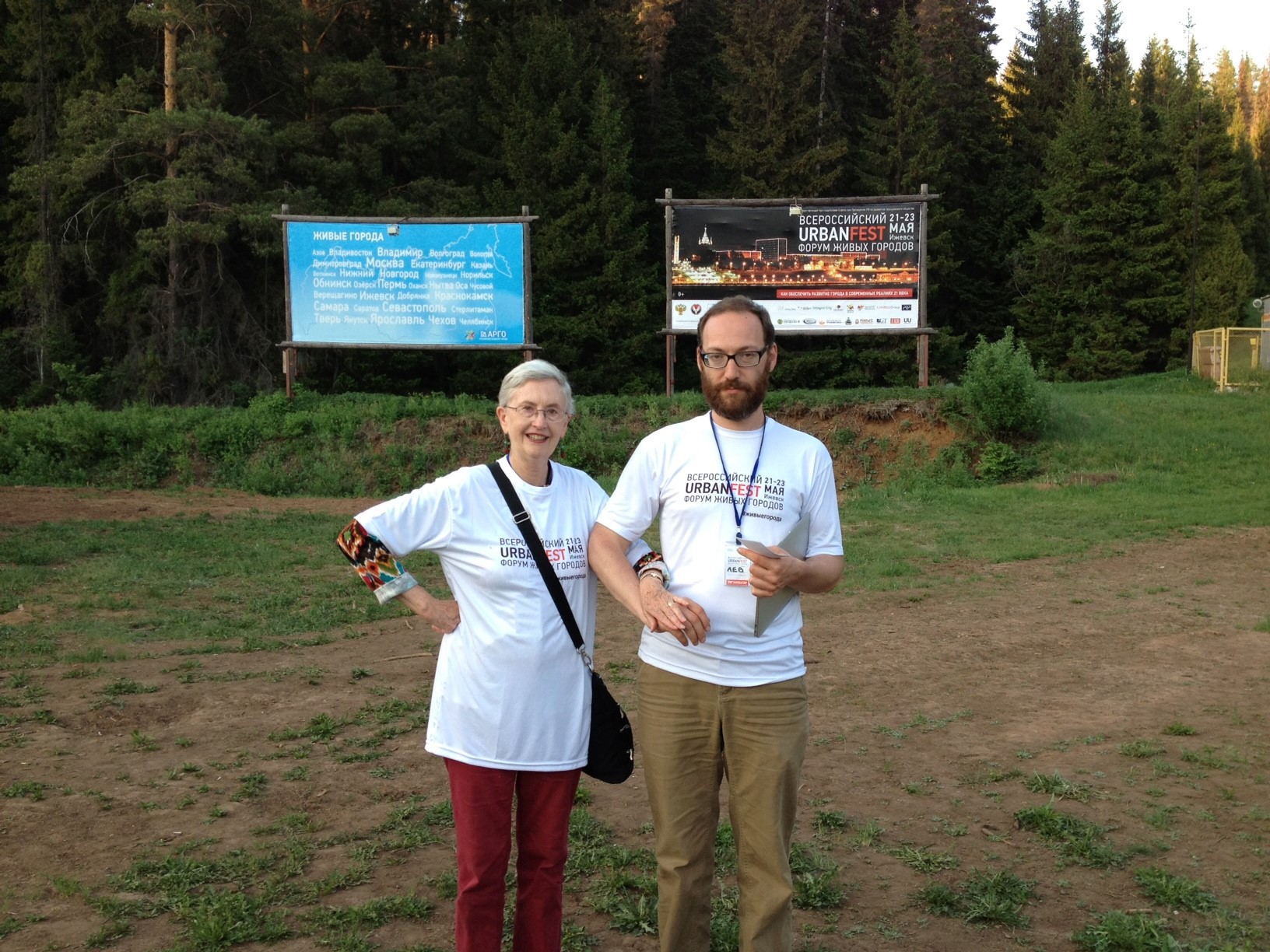
Marilyn Hamilton and Lev Gordon at UrbanFest 2014 (you can see Urbanfest’s billboards in the background).
MH: What is your leadership role in the Living Cities Charter?
- What do you hope will result from this initiative in terms of influencing other Leaders in Russia / Russian cities?
LG: After the second National Forum of Living Cities in May 2015, all experts and participants agreed that: a) cities are like living organisms and best cities share the same characteristics—they are able to self-organize, adapt and develop; b) most cities in Russia are sleeping or frozen, not using their resources to the full; c) there must be ways to awaken the city and transform it into a prosperous developing city regardless the size and location; d) most cities lack the vision of where and how to develop, and so we take responsibility to offer a new vision for city development and implement it in 1 000 cities by 2030.
The new vision that is largely based on integral city development concept adapted to real-life circumstances will be presented in Living Cities Charter—a set of principles that we are now developing through an open code process engaging hundreds of experts and practitioners of city development from over 50 cities across the country. This is an exciting and really heart-warming process as very smart and inspired people come together and enjoy friendly communication and meaningful cooperation while advancing their cities and country. I am very grateful for this opportunity, really.
After the vision is developed and agreed upon, we will put forth a set of practical tools and project examples as to what cities could do to implement those principles. Finally, with divine help we will establish bottom-up and top-down support structures to gradually implement the new vision and the best practices widely. As the possible outcome we see transformation of a 1000 cities into vibrant places where people fully live their potential and contribute to evolution of others as well as the well-being of their city, country and the world. “You may say I am a dreamer, but I’m not the only one”, you know (laughing)
MH: What are your views of Leadership in Russia at the organizational, city, state, national level?
- What do you want the West to know about Leaders in Russia that the popular press does not tell them?
- What do Leaders in Russia most need to learn to realize their highest potential?
- How and where can you lead Russian Leaders from “half a step ahead”?
LG: This is a difficult question. I would need to explore the real situation and so I will try to interview some key leaders of our country and hopefully our readers will hear from them first-hand in this and coming months in ILR. I would love to interview Vladimir Putin, our president, Alexei Kudrin, ex-minister of finance and founder of Foundation for Civic Initiatives, German Gref, head of Sberbank, Russian largest bank, Andrei Sharonov, rector of #1 business school SKOLKOVO, Andrei Nikitin, head of Agency for strategic initiatives, government body responsible for fostering innovation and progress on a country scale, Alexander Brechalov, head of Russian Civic Chamber, Sergei Kirienko, ex-prime minister and now head of ROSATOM, perhaps a most effective state-owned corporation and a few others. Let’s see whether we’ll be able to get them in ILR in time for the publication in early 2016… Thanks for great idea!
MH: How has your leadership grown, shifted, changed since starting ARGO? Since the global life conditions have changed with sanctions against Russia, the drop in oil price (and value of ruble); and the Syrian war / Refugee crisis. What has surprised you?
- What have you learned about your individual leadership as you have started new initiatives and seen national and global life conditions change so drastically and rapidly?
LG: Marilyn, each of your questions entails an extended answer if I mean to answer them properly I would need to talk for hours! Well, very briefly on some of these points… I clearly became much more direct and self-reliant from dealing with many strong people and facing obstacles. As a leader, I obtained inner strength that I could use at will while—interestingly enough—simultaneously allowing myself to feel more vulnerable and be more sensitive and aware of my own weaknesses and pain, anger and aggression, sadness and isolation that occur sometimes. Through opening up to the whole spectrum of emotions and inner states, by allowing them to manifest freely in my sphere of awareness without letting them dominate my actions I, as it seems, have also received greater access to male power and inner clarity, psychological balance and resolve when and where my conscious Self finds it appropriate to manifest in circumstances that I face. Along with new power came true humbleness, which is nice.
I have also expanded greatly my communication toolbox and in ways I could have never imagined—not with artificial tricks, but really with an enhanced connection to the deepest levels of reality, inner connection with spiritual dimension. Call it what you want but quite often I now experience a sense of direct connection to the invisible power and wisdom that communicates through me, and the more brave on a personal level I am, the stronger I feel the flow of Life and enjoy sometimes an amazing access to the force that lies beyond rational explanations. People who witness me in these moments tell me that. I hope this does not sound too spooky (laughing) and I am sure most leaders are well familiar with this phenomenon when they tackle authentic challenges that affect the planet and the people.
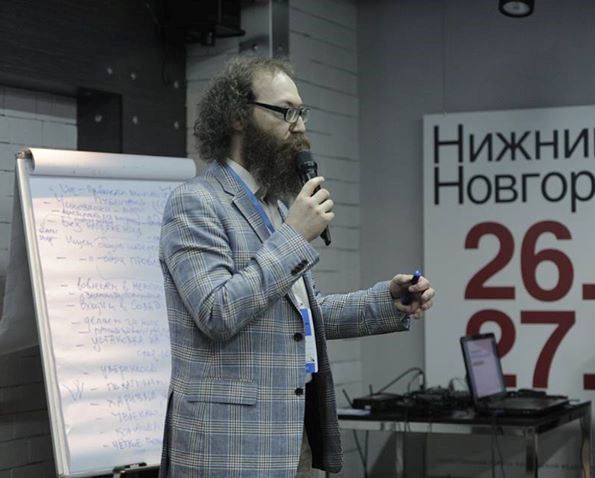
Lev Gordon, facilitating a workshop on the basics of interaction with government at the Community Forum in Nizhniy Novgorod (March 2015).
To continue with your questions… as Russia entered a period of sanctions in 2014 I noticed an incredible surge in patriotic feelings amongst 80% of the population across all age, social and professional groups. I think for years many people subconsciously felt lack of… respect on a national level—I am talking here about more government to government dealings, not so much about regular people who are great and friendly everywhere. You know? After the collapse of the Soviet Union people in Russia went through a very difficult transition period when both material and psychological comfort was virtually non-existent. They were deprived of their past—in the sense of not being able to feel proud or finding security in the things passed, they did not have much wealth, and nothing really to aspire to or get comfort in. But even worse, society lost a guiding vision and a system of values that provided meaning to their lives.
I will not go deep into Spiral Dynamics and Integral Theory analysis here, but would just emphasize my view that political leaders of the Western world lost in late 1990s-early 2000s a historical chance to create a more peaceful and interconnected world by treating Russia with respect and dignity and integrating it as an equal into their worldview and system of relationships. They likely made the best choice they could while facing their old fears and following old patterns of relying on power and control. Possibly, they had a clear rationale in the short term—but really they lost in a long term, or more properly, we all—humanity, all citizens of the world—we all lost an opportunity to move to the next stage and create a new level of security, cooperation and unity in the Northern hemisphere at least. Clearly, Russian culture is an integral part of civilization in the Northern hemisphere, and it was possible and is still possible I am sure to establish a deep dialogue and reach breakthrough agreements and new levels of mutually beneficial cooperation, but it takes truly great leaders with advanced structures of consciousness activated and operational—which in my view are virtually absent among the current political elite of the world. Without any doubt, I feel that given the opportunity and authority I personally would broker agreements that would move our countries to the next level where everyone would win and win big. You know that “win-win” solutions are becoming out-dated now and what we should aim at is win-win-win for both sides and for the world at large.
Leaders at advanced developmental stages can do exactly this—see the complexity of the situation, many different viewpoints, see how situation develops in time and how various parts fit or could fit together to move to the next level of energy, maturity, what needs to be done to realize its inner potential, enter the flow of Tao. Finding common ground and specific language to talk to various parties is another critical skill, that includes sensing their emotional and mental state and being able to shift your perspective to theirs and back and then to an all-encompassing view that permeates and includes individual and collective perspectives of all stakeholders as well as finding a profound yet often simple move that allows all systems to move to the next level. I am sure you understand what I mean and given an opportunity many of us would support our countries in creating this new level of cooperation and unity for the sake of human survival, progress and prosperity.
MH: As a Leader who/how do you re-energize yourself? (Practices, Community, Books, Resources, etc.)
LG: Contemplation. Love. Friends.
Witnessing the flow of Life.
Kundalini and Tibetan Yoga. Chi kung. Good night‘s sleep.
Words of my teachers and mentors.
Eyes of my students. Smiles of my colleagues.
Being with Nature. Dwelling in Spirit.
Being simple, silent, natural, authentic.
Seeing perfection in everything.
Letting things be as they are.
MH: What would you recommend are integrally informed opportunities for leaders in the BRIC and MINT countries who want to lead in service to global wellbeing?
Not sure I am in a position to recommend anything to others, yet if you ask… 1) Find your inner calling, intuitively feel and follow the impulse of the universe; 2) Listen to your heart and see the world with your heart as well as your mind; 3) Discover that others are intimately connected to who you really are; 4) Find who you really are; 5) See #1 (laughing)
Thank you, Marilyn, for your patience and kindness. Apologies to our readers for my meaningless rumblings. Whatever good was in my words is entirely due to my kind teachers and beloved forefathers. All errors are entirely my fault. All I know is that the Sun is always there even when all we see is clouds…
MH: Thank you Lev—I am sure that your “meaningless rumblings” will bring much meaning and hopefully inspired rumblings to the Leaders and Readers of ILR—including and especially those in the West who want to learn how a Leader such as yourself has emerged out of and thrives in Russia. (Of course I am also particularly appreciative of your Integral City pioneering and long term view.) May all your endeavours be blessed by the Master Code – taking care of yourself, others, places and planet!!
About the Interviewee
 Lev Gordon is a lifelong student of human condition, communications and leadership.
Lev Gordon is a lifelong student of human condition, communications and leadership.
He graduated with honors from St. Petersburg University of Telecommunications, received Master in European Business from Ecole Nationale Superieure des Telecommunications de Bretagne, Executive MBA in Strategy and Leadership from Columbia Business School, attended executive education programs at Harvard Business School, London Business School and other leading institutions around the world.
After working for 12 years in telecommunications and financial sector on various projects with 35 countries, Lev returned to Russia where he served as president of a private university and later co-founded Association for city development and Forum of Living Cities applying principles of integral development. He is an expert with Russian Parliament, National Agency for Strategic Initiatives and Civic Chamber of Russian Federation.
Lev knows life as a big dream and learns to be in sync with its flow.
Contact email: levagordon@yahoo.com
About the Interviewer
Marilyn Hamilton, PhD, CGA, CSP, is founder of Integral City Meshworks Inc. and TDG Global Learning Connections www.integralcity.com . She is a charter member of Integral Institute, Globe Sustainable City Awards, Centre for Human Emergence: Canada, Canadian Professional Sustainability Institute and Training Trainers for Spiral Dynamics integral. Author of Integral City: Evolutionary Intelligences for the Human Hive (2008, New Society Publishers) Marilyn hosts, applies and teaches Integral City intelligences for designing change in the city that is ecologically informed and operationally integrated with a community of practise in Canada, USA, Mexico, Scandinavia, Europe, Russia, Asia and Australia. Gender, generations and evolution have been themes on which she has recently published.
Contact: marilyn@integralcity.com ; www.integralcity.com

